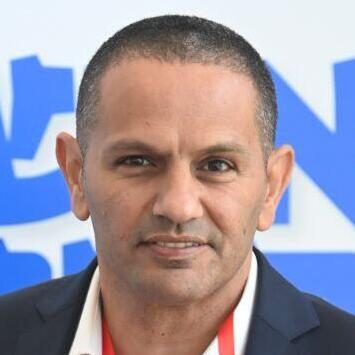Getting your Trinity Audio player ready...
Despite the confrontation in Gaza two days ago, where Warrant Officer G'haleb Sliman Alnasasra was killed, and the fairly intense day of attacks in Lebanon, the most urgent issue on the agenda for Israel's defense and political leadership remains Iran's nuclear program.
In a few days, General Michael Kurilla, the commander of the U.S. Central Command (CENTCOM), will arrive in Israel for a crucial visit. While the visit includes a range of security and diplomatic discussions on all fronts in which Israel is involved, its primary focus is ensuring that the U.S. and Israel remain aligned operationally and in terms of intelligence, especially amid U.S.-Iran nuclear negotiations.
2 View gallery


General Michael Kurilla with former IDF Chief of Staff Herzi Halevi
(Photo: IDF Spokesperson's Unit)
Kurilla is considered one of the most prominent advocates for a joint U.S.-Israel strike on Iran's nuclear facilities. He views Iran's progress in its nuclear program as a global threat and believes Israel should not have to lead this effort alone. His stance is one of the most vocal in the Pentagon supporting this approach, which is why his visit is seen as highly significant in Israel. Behind closed doors, his perspective on the ongoing talks between U.S. envoy Steve Witkoff and Iran's foreign minister Abbas Araghchi—talks that deeply concern Israeli officials—likely will be discussed.
Kurilla is considered one of the most prominent advocates for a joint U.S.-Israel strike on Iran's nuclear facilities
Additionally, as Kurilla nears the end of his term as CENTCOM commander, this visit is an opportunity to strengthen strategic coordination between the two countries. There is concern that his successor could adopt a more isolationist stance, resembling some of the approaches seen during the Trump administration, which often preferred appointees loyal to a specific political hierarchy.
Israel continues to assert that the option for unilateral action against Iran remains on the table, with the Israeli Air Force intensifying preparations for either a joint or independent operation. Reports emerging from the nuclear talks reinforce the pessimism expressed by Israeli officials. While Israel claims it is not excluded from the discussions, there is concern about a potential "soft deal" that would lack effective oversight, allow Iran to continue advancing its military nuclear capabilities, and include concessions that might prevent a joint U.S.-Israel strike.
2 View gallery


centrifuge machines in the Natanz uranium enrichment facility in central Iran
(Photo: AP)
Accordingly, Israel insists that unilateral action remains viable if necessary. Intense discussions are ongoing within the defense establishment, and the Air Force is ramping up preparations for potential action—whether coordinated with the U.S. or executed independently. President Trump has not denied last week’s report in The New York Times but stated that he has not "ruled out" military action, claiming he is "not in a rush."
Get the Ynetnews app on your smartphone: Google Play: https://bit.ly/4eJ37pE | Apple App Store: https://bit.ly/3ZL7iNv
A major concern within Israel’s defense establishment, particularly among officials at Israel's Defense Ministry headquarters in Tel Aviv, is whether Trump might not only refuse to act jointly with Israel but also impose a complete veto on any military action. Such a scenario would be tantamount to a "red card" for Israel, severely harming its strategic position.
Another issue that will require Kurilla's attention is the U.S. withdrawal from Syria. As revealed last week by Yedioth Ahronoth and Ynet, the U.S. has decided to significantly reduce its military presence in Syria, with fewer than 1,000 American troops expected to remain in the region. This development is not surprising to those who followed Trump’s campaign rhetoric and are familiar with the isolationist tendencies of his administration.
 Yossi Yehoshua
Yossi YehoshuaFollowing the escalation in the Middle East, primarily fueled by Hamas’ October 7 attack, the reduced threat posed by the Iranian axis and the administration’s isolationist approach are leading Washington to scale back its forces to pre-escalation levels. Unlike the Biden administration, it is doubtful that we will see Israeli Prime Minister Netanyahu openly criticize President Trump. Netanyahu has placed all his bets on Trump, and now Israel can only hope that Trump doesn’t "scramble the eggs" of this fragile alliance.


